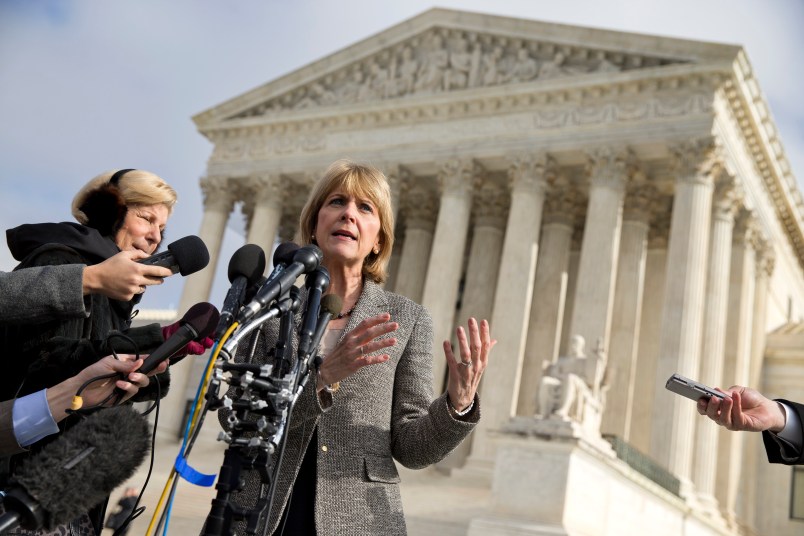The Supreme Court has unanimously struck down a Massachusetts law that created a “buffer zone” around abortion clinics, barring anti-choice protestors from standing within 35 feet of the entrance of reproductive health clinics that provide abortion care. Not surprisingly, this law didn’t go over well with protestors, who claimed that such a zone interfered with their attempts to do what they euphemistically called “counseling” — approaching women that were going into the clinic and harassing them about their medical decisions.
The law was challenged on First Amendment grounds, and as of today, the Supreme Court has agreed that having a buffer zone around an abortion clinic is unconstitutional. No word on if the Justices see any irony in the fact that their office is protected by a buffer zone almost three times as large as the one at issue in the Massachusetts case. How is it that a 100-foot buffer zone around an already heavily protected federal building is kosher, but ensuring that small health clinics receive a tiny bit of the same protection is unconstitutional?
There’s also the small matter that the Massachusetts law was not banning protestors. The protestors were able to stand outside the clinic; they were able to yell and hold signs and pass out literature all day long. They’re even allowed to keep calling themselves “counselors,” although they’re not licensed or trained and don’t counsel so much as push one unyielding viewpoint. They just weren’t allowed to invade an individual’s personal space and follow her to the door of a building.
Being able to see a health care professional without being harassed by complete strangers is something we generally take for granted in this country. Yet with this decision, the Court has made it clear that it’s perfectly fine for those opposed to abortion to harass people, but not perfectly fine for those receiving legal medical care to do so without getting harassed.
This double standard around abortion care is hardly unique to the Court. For years, reproductive rights around the country have been eroded to the point that in many places abortion is legal in name only. Anti-choice politicians, judges, and activists are actively trying to see just how far they can push the decision of Casey v. Planned Parenthood, which holds that women may not encounter “undue burdens” in accessing abortion care but does not specify exactly what qualifies as such. Would encountering yelling, intimidation, and invasions of personal space count as an undue burden to getting necessary medical care? According to a unanimous Supreme Court, no. According to common sense, yes.
There are two silver linings to this decision — well, perhaps less silver, more dull pewter. The Court declined to overturn Hill v. Colorado, a 2000 decision that created smaller, “floating” buffer zones around all health clinics, not just abortion clinics. Equally significantly, the Court held that that, according to the Center for Reproductive Rights, “governments have a significant interest in protecting a woman’s freedom to seek pregnancy-related services—including abortion—and that states can pass laws that protect access to clinics.”
States can, and they must. Because the now-invalid Massachusetts law did not come about just because the state felt like keeping its sidewalks clear, or ensuring people could walk into a clinic without getting bothered, or just because it listened when police officers said that, after trying other methods, the 35-foot buffer zone was the best way to balance public safety and free speech. Massachusetts passed this law in response to the history of violence it had seen around abortion clinics, most notably the 1994 murders of two Planned Parenthood employees that also left five people injured.
This decision is naturally a setback for women’s safety. But more than ever, it’s important to remember that safety is in our own hands, not the courts, and fundamentally that’s always been true. In more towns than most people realize, the police departments are interested in helping—regardless of their views on reproductive rights, few cops take kindly to harassment. And both Planned Parenthood and individual communities run volunteer clinic escort programs, so that patients don’t need to walk alone through the antis’ gauntlet. More information can be found on Planned Parenthood’s website, or by contacting your local clinic.
Sarah Erdreich is the author of Generation Roe: Inside the Future of the Pro-Choice Movement. She lives with her family in Washington, D.C.







Have the baby then hand it over to the pro-life ’ councillors ’ .
“…How is it that a 100-foot buffer zone around an already heavily protected federal building is kosher…”
Because conservatism requires two sets of laws – one that applies to the elite, and one that applies to everyone else.
So then it’s cool to harass pro-lifers? PARTY!
THINK OF THE CHILDREN!!!1!!!1!
Which they rarely do, save for cutting social programs related to children.
They tried that in Ireland handing the children over to the Nuns. It didn’t work real well.